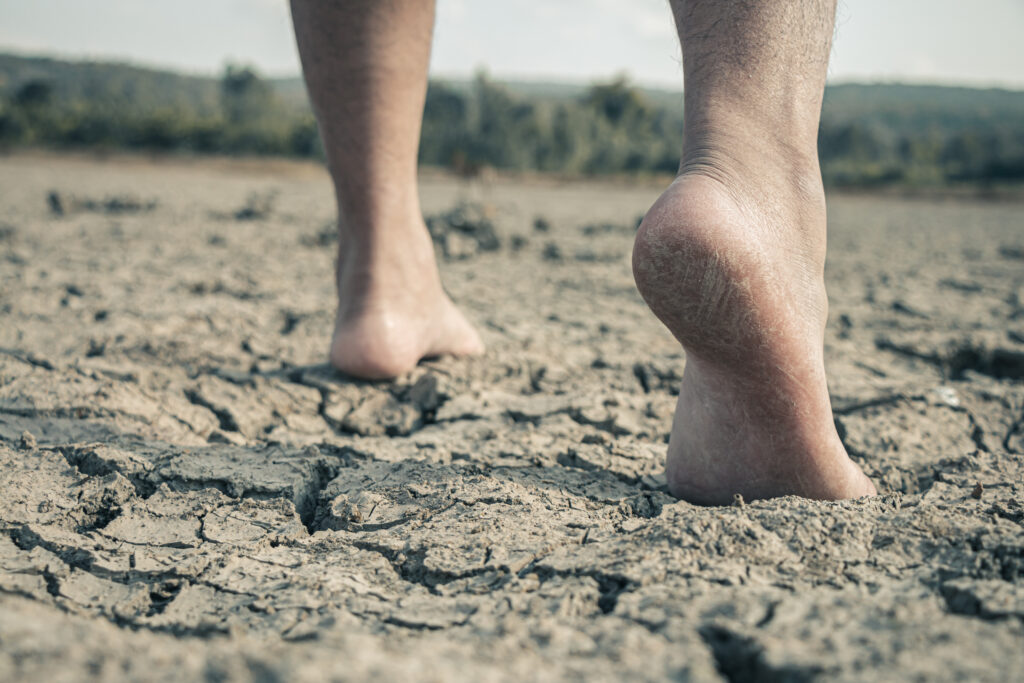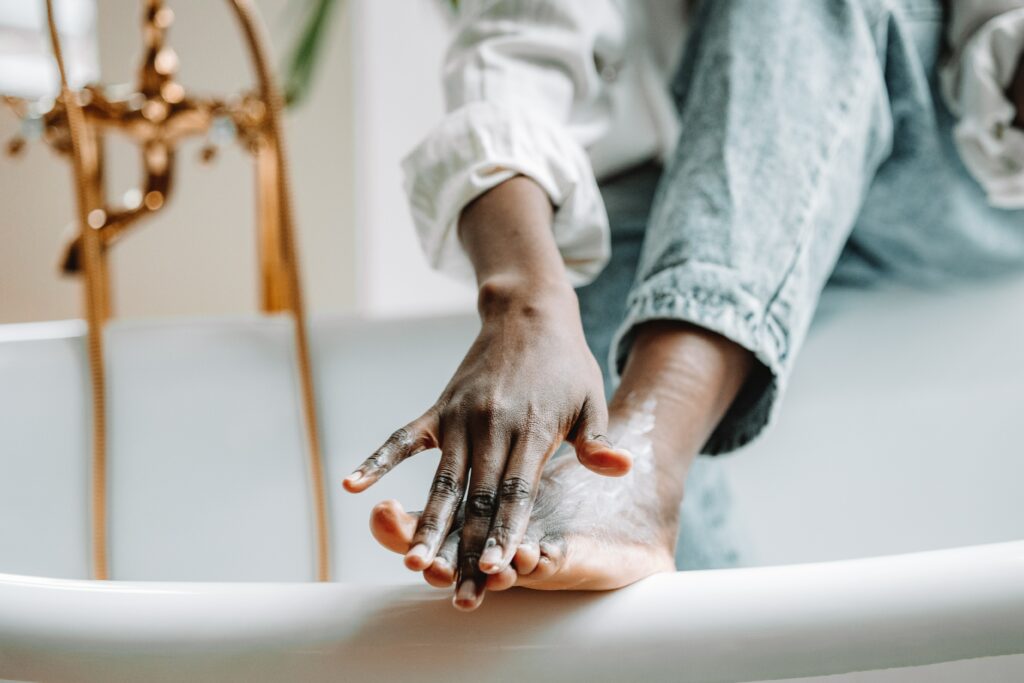Cracked Feet
Dry skin happens all over the body. On the feet, though, it can lead to cracking – a painful condition that can lead to discomfort and even infections.
Cracked feet is a common foot condition. It is essentially a build of dead skin cells forming a thick, crusty layer which can lead to cracking. It has a wide range of causes and can affect anyone, although some people are more prone to cracked feet – such as women and the elderly.
It’s important to understand the underlying cause of cracked feet and seek treatment. Otherwise, the issue could worsen over time. Below you will learn the common symptoms and causes, as well as the best prevention and the best way to treat dry, cracked feet.
Cracked Feet – The Symptoms
Understanding the symptoms is the first step to knowing if you have cracked feet. Here are the most common:
- Dry skin on feet
- Painful, cracked feet
- A tight feeling
- Itchiness
- Dry peeling skin on feet and skin peeling between toes
- Heel cracking or fissures
- Redness
- Swelling
- The appearance of fine lines
- General discomfort (especially when walking)
- Bleeding through cracks
These symptoms are indicative of dry feet and show that you should seek further treatment to heal the dryness. Some of the signs could point to other conditions that affect the feet. Peeling skin, for example, could also be a symptom of athlete’s foot cracked feet.

Cracked Feet – The Causes
Cracked, dry feet can be a sign of an underlying issue, or it could simply be an environmental factor. It’s important to understand the cause so that you know how to treat your cracked feet.
Health-related causes
Health-related causes are known to cause cracked feet (among other symptoms). These include vitamin deficiencies, fungal infections, pregnancy, and diabetes.
Cracked feet and diabetes are related because of the nerve damage caused by diabetes, which affects moisture levels. Many people with diabetes wear specialised socks for diabetics due to this reason.
Vitamin C, E, and B-3 also contribute to cracked feet. If that’s the cause, eating foods containing high levels of those vitamins may help. You could also take a vitamin pill to up your levels.
Environmental factors
Many environmental factors contribute to cracked feet. The warm weather can lead to dehydration. On the opposite end, cold weather can cause cracked feet because of the dry winds. It’s important to protect your feet from the elements to prevent excessive dryness and cracking.
You might also discover cracked feet after using certain skin products, such as soaps. If a soap bar is too harsh on the feet, it will strip the skin’s natural oils, leading to excessive dryness. It’s better to switch to a gentler soap for this reason.
Ageing
Ageing can lead to severe cracked feet over time. Changes to the metabolism as well as hormones mean that skin cells don’t regenerate as quickly as they did in your youth. That leads to thicker skin, which in turn leads to cracked feet.
When you age, your feet require an extra level of care. Keep an eye on your feet and invest in a good foot cream for dry cracked feet to lessen excessive dryness that occurs naturally with ageing.
Skin Conditions
Many skin conditions are linked to cracked feet, such as athlete’s foot, atopic dermatitis, rashes, and psoriasis. These conditions often have other symptoms along with cracked feet – a rash will also show redness and may be itchy.
If you want to heal cracked feet caused by a skin condition, you must first address and treat the condition. For example, if you have athlete’s foot, you could use an antifungal cream.
How to Prevent Cracked Feet
It is easier to prevent cracked feet than it is to treat them. Learn how to prevent cracked feet so that you don’t have to deal with its symptoms.
Wear proper footwear
The wrong pair of shoes will exacerbate cracked feet. Wearing sandals or too-tight shoes too often will lead to dryness and cracking. Instead, wear high-quality, protective shoes that fit perfectly and don’t rub. Doing so will help prevent cracking and fungal flaky skin on feet.
Don’t take long hot showers
The sensation of a hot shower can be calming, but it dries out your skin – including that on the feet. If you must take hot showers, keep them short. If you can, lower the temperature of your shower. Cooler showers aren’t just beneficial for your feet, but it also helps keep your skin and hair healthy, too.
Moisturise feet
Moisturised feet are better protected against crusty feet and dryness. Use a cracked feet cream and put it on every morning and night to help lock the moisture in. Wearing socks during the night can help lock it in, too.
Avoid harsh soaps
Harsh soaps strip your skin of its natural oils, which is another reason for cracked feet. Look out for gentler soaps that don’t contain perfume and use those instead.
Stay hydrated
Dehydration leads to dry skin all over the body, including dry feet. Staying hydrated is a key way to prevent feet from drying up and eventually cracking.
Self-care Treatments for Cracked Feet
Cracked feet is a condition that doesn’t always require a trip to the doctor. These home remedies for cracked feet may clear it up altogether or help alleviate the symptoms.
Creams and ointments
Finding the right lotion for cracked feet makes a world of difference. A bespoke foot cream for dry and sensitive skin, such as Decubal Foot Cream, is a good choice. It’s hypoallergenic and contains no fragrance, so it’s safe to apply. Use it morning and night for the best results.
Foot file
If you have excessive dead skin on your feet, foot filing is a good solution. Use one to scrub away dead skin cells to reveal the newer skin underneath. The process might feel slightly uncomfortable, but it is effective.
Soaking
Foot soaks are a helpful cracked feet remedy. If your feet are particularly dry and cracked, assemble a foot soak for cracked feet.
Foot Peel
A foot peel is another great cracked feet treatment that helps remove dead skin cells. Use with combination with a foot moisturiser such as Decubal Foot Cream.
Exfoliation
There are plenty of excellent foot exfoliators to help remove dead skin. Use one regularly, and always remember to follow up with a good foot cream to prevent dryness.

When to See a Doctor
Severe cracked feet can’t always be treated at home. Sometimes, you need the help of a doctor to get to the root cause and provide adequate treatment.
If you experience soreness, redness, swelling, or bleeding in the cracks, you could have an infection, and you should see a doctor. In this case, the infection needs treatment first. The doctor may also prescribe you a cream to combat dryness.
You should also visit the doctor if you think there’s an underlying health issue causing the cracked feet – especially if it doesn’t go away. As well as providing a solution for dry cracked feet, the doctor will also be able to diagnose you properly. Once you know the cause, you can work toward healing.
Another reason to visit the doctor is if home remedies are not working no matter how many you try. In this case, you might need a stronger treatment such as a steroid cream.
Why Treat Cracked Feet?
Cracked feet are more than a small cosmetic issue. Leaving it can lead to worsening symptoms and even impact a person’s self-esteem. Here are the main reasons to treat cracked feet as soon as possible:
Cracked feet can lead to infections
A slight case of dry and cracked feet might not seem like an issue, but it may worsen and lead to an infection. Treat it quickly to stop this from happening.
For more comfort
Dry itchy feet are anything but comfortable. Treating cracked feet means providing yourself with more comfort, less itchiness, and less chance of future pain.
It’s important to keep going with your treatments – don’t stop once you see improvement. It’s about turning to better habits.
To combat self-esteem issues
Some people might feel insecure about their feet if they have visible cracking. You might not feel comfortable in certain shoes if you have a scaly toe or cracked heels. Combat the cracked feet to feel more comfortable in your skin.
Cracked Feets FAQs
What’s the best cream for cracked feet?
Any hydrating, moisturising foot cream such as Decubal Foot Cream is great for treating the symptoms for cracked feet. The Decubal Foot Cream is a good option as it is hypoallergenic and contains zero perfumes.
Does using a foot file hurt?
Using a foot file should not hurt. You are removing dead skin cells, after all. If it starts to hurt, it’s time to stop, as you have likely reached the new skin.
What socks are best for cracked feet?
Wearing socks at night can help cracked feet, but you should choose the right ones. Moisturising gel socks help seal in the moisture to help prevent dryness. Your feet will feel softer in the morning.
Does diet impact cracked feet?
Vitamin C, V-3, and E deficiencies are possibly connected to dry feet, so there is a chance that diet has an effect. Drinking water does impact it, as dehydration can lead to drying skin.
Is cracked feet a sign of an underlying issue?
Cracked feet are caused by various issues. It might be the case that it’s a sign of an underlying problem, such as athlete’s foot or psoriasis. If you’re unsure, it’s best to speak to your doctor.
Links & Source
- https://www.afacc.net/foot-problems/infections/
- https://www.ipfh.org/foot-conditions/foot-conditions-a-z/cracked-heels#:~:text=In%20severe%20cases%2C%20the%20cracks,cracked%20skin%20on%20their%20feet.
- https://www.healthline.com/health/cracked-heels-vitamin-deficiency#:~:text=Vitamin%20C%2C%20vitamin%20B%2D3,process%20can%20be%20factors%2C%20too.
- https://www.familysavvy.com/listerine-vinegar-foot-soak-for-soft-feet-help-or-hype/
- https://www.afacc.net/foot-problems/infections/
No products found